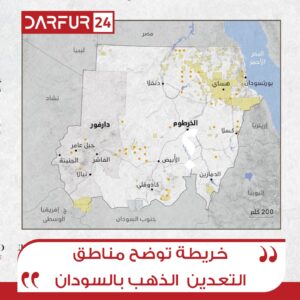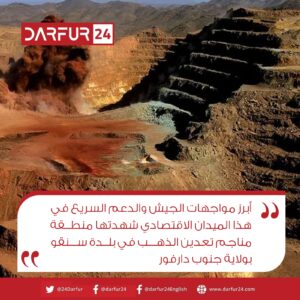Investigation: compiled jointly by Darfur 24 & Ayin Network
A different kind of war has been taking place between the Sudanese army and the Rapid Support Forces (RSF )over the most important gold resource in feeding the coffers of both parties and financing the military operations that have been ongoing since the fifteenth of last April in Sudan.

The fierce confrontations between the army and the Rapid Support Forces( RSF) in the economic field occurred in the gold mining area in the town of Singo in the state of South Darfur in mid-May, which resulted in the death of seven people and the wounding of others. After that, the Rapid Support Forces seized the army garrison that had left the mining areas for the “Maraya” camp on border with the state of South Sudan – according an employee working for Al-Junaid Company, which specializes in mining, buying and selling gold and is owned by the Rapid Support Forces who preferred his identity to be kept anonymous.
Although private miners and gold exploration companies reported major problems facing mining operations after the outbreak of war in many mines in the Darfur region, information obtained by Darfur 24 indicates that the quantities of gold that were produced before the outbreak of the April 15 war are currently being marketed in the countries of Chad and Africa.
Central Africa is in a cumbersome deportation process in which motorcycles are used to cover hundreds of kilometers, which reinforces previous information that this gold was purchased by a Russian company operating in Central Africa.
Meanwhile, an employee working for Al-Junaid Company says, “The company’s production was transferred to the city of El Daein, the capital of East Darfur state, and is stored there temporarily.”
Russian Wagner and Sudan Gold
Local sources told Darfur 24 that they did not notice the presence of the Russian paramilitary company “Wagner” in the Singo mines for gold exploration located on the border with Central Africa, and that the company is present in the mines of Central Africa, and there it was attacked by “Seleka” a militants group fighting to overthrow the Central African government.
It has been reported that Seleka fighters killed several members of Wagner group in central African Republic.
While the British government said in a statement seen by Darfur 24 – that the gold smuggling operations carried out by the Wagner Company from Sudan are large, as one of them described them as “crucial to Russia’s ability to withstand the heavy sanctions imposed against it due to its illegal invasion of Ukraine,” but according to a report African Intelligence, the closure of the country’s airspace has led to a change in the export routes of the precious metal.
While both parties to the fighting continue to commit violations against civilians, the war leaves a humanitarian tragedy with about 5 million people in need of aid, more than 4.2 million people internally displaced, and 1.2 people fleeing to neighboring countries.
These conditions prompted countries to exert pressure on both sides to stop the fighting. The United States then imposed economic sanctions and visa restrictions on the parties that commit human rights violence in Sudan, with the aim of drying up the sources of funding for both parties to the conflict (the Sudanese army and the Rapid Support Forces).
While the United Kingdom says, the war in Sudan has been exacerbated and prolonged due to the huge financial empires that support the Sudanese Armed Forces and the Rapid Support Forces.
Multi-billion-dollar conglomerates and corporations linked to both sides have provided them with a steady source of money and weapons, enabling the continuation of fighting that has seen atrocities committed against civilians.
Sanctions has been imposed on 6 business entities on both sides of the war, and these sanctions will send a strong message to those providing funding and supplies to the Sudanese Armed Forces and the Rapid Support Forces that the ongoing conflict is unacceptable and the violence must stop.

War limits production
Gold mining operations stopped after eruption of war in all mines where the investment arms of the Rapid Support Forces are located.
Before the war on April 15, about one hundred thousand local miners were active in the most prominent mines in the Sanqo region, which are “Agbash, Dharaba, Thuraya, Wad Nyala, Sarfaya and Jumana,” in addition to other mines in the foothills of Jebel Marra and areas controlled by the Sudan Liberation Movement led by Abdel Wahid Muhammad Nour, the most famous mining area in the region in the Jebel Amer region, North Darfur.
According to sources who spoke to Darfur24 from the gold exploration areas in Al-Radom locality, 360 kilometers south of the city of Nyala, the capital of South Darfur, said the reason for the cessation of gold mining operations is the high prices of fuel used in exploration operations and the lack of security in the mining areas, but there is information obtained by the newspaper indicating that there are ongoing arrangements to resume excavation operations after the current rainy season comes to an end.
Musa Abkar Karama – a local gold miner in the Singu mines adjacent to the border with the state of South Sudan told Darfur24 that gold mining operations have stopped since the start of the war between the army and the Rapid Support Forces due to the rise in fuel prices, whereby the price of fuel barrel rose to 800 thousand pounds instead of 160 thousands before the conflict.
Meanwhile, Jabara Bakhit, who works in the mining field, said that exploration operations during this period are facing major problems, in addition to the rise in fuel prices, and the problem of security chaos has emerged as tribal gunmen spread around the mines and threaten the miners.
Jabara pointed out that the responsibility for security in the mines was the responsibility of the Rapid Support Forces, but after the outbreak of war, the Rapid Support Forces withdrew most of their forces from the mines and left some of them to protect the mechanisms of Al-Junaid Company, the investment arm of the forces.
The Sudanese General Company revealed a significant decline in gold production during the conflict from April 15 to last August, when it fell to only two tons, in stark contrast to the previous year’s production, which exceeded 18 tons.
Meanwhile, a report by CEIC, a company specializing in macroeconomic data, citing the US Geological Survey, indicates that Sudan’s gold production reached 50,000,000 kilograms in December 2022.
Return of production and corporate legality
A tribal leader affiliated with Habbaniya tribe, the tribe in whose land “hakura” the gold mines are located – said that there were security breaches in the mines, which prompted them to form a committee of tribal leaders to address any problems that occurred after the war between the Rapid Support Forces and the Armed Forces.
Tribal leader, Mayor of Sabahi Al-Fadil, expected the exploration to return after the rains stopped, in light of the fact that the process of transporting fuel would be easier than in the countries of South Sudan and Libya.
The mayor warned that the number of miners is currently declining in the mines due to the participation of most of them in the war alongside the Rapid Support Forces in Nyala and Khartoum.
An employee at Al-Junaid Company – who preferred to withhold his identity -confirms that the company has stopped its mining operations since the beginning of the war due to the rise in fuel prices. He said that they use the fuel they have only for lighting.
The employee at Al-Junaid Company agreed with an employee at the Sudanese Mining Company about the cessation of work in the mines since the outbreak of the war. the war.
The activity of companies operating in the field of mining and owned by the Rapid Support Forces raises legal questions about their continued activity in the mining blocks that were transferred to them through official bids. Lawyer Hatem Elias says, “There is an important question: Is stopping these companies from working in mining done by an executive decision issued by the Sovereignty Council or by the Minister of Minerals? This is possible within the framework of their powers, but it remains a decision that can be appealed before the Administrative Judiciary Department in the normal situation.” “. Elias added: “But we are now talking about war situations in which everything is done exceptionally, so I think that any decision or legal actions at this moment are marred by imperfection and cannot be relied upon except in the case of a stable situation and a normal and stable judiciary.”

